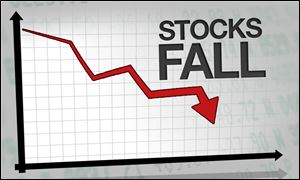
US stocks decline for a second straight day; oil falls
11/15/2017
Specialist Mario Picone works at his post on the floor of the New York Stock Exchange on Wednesday. U.S. stocks declined in early trading Wednesday as investors weighed a batch of economic data and company earnings.
ASSOCIATED PRESS
Technology companies led U.S. stocks lower Wednesday, giving the market its biggest loss since early September.
Grocery stores and packaged foods and beverage companies also accounted for much of the decline. Energy stocks fell as the price of crude oil closed lower a day after its biggest loss since October. Banks and phone companies eked out modest gains.
The latest slide extended the market’s losses from a day earlier and added to its pullback in November.
Unlike October’s broad market rally, fewer stocks and sectors have been notching gains this month, and the latest market decline reflects that, noted Bruce Bittles, chief investment strategist at Baird.

RELATED: Searchable stock index
“And that’s exemplary of a market that’s losing momentum, and that’s the real story here,” Bittles said. “It means the market is struggling here, and it could mean that a lot of the good news on the economy, earnings and even the potential for a tax-reform bill are to a great extent already built into current prices.”
The Standard & Poor’s 500 index fell 14.25 points, or 0.6 percent, to 2,564.62. The Dow Jones industrial average lost 138.19 points, or 0.6 percent, to 23,271.28. The Nasdaq composite slid 31.66 points, or 0.5 percent, to 6,706.21. The Russell 2000 index of smaller-company stocks gave up 7.16 points, or 0.5 percent, to 1,464.09.
The major indexes are all in the red for the month, but still near their most recent record highs.
Stocks were headed lower from the get-go on Wednesday as investors weighed a batch of new government data on inflation, retail sales and manufacturing.
The Commerce Department said retail sales rose 0.2 percent in October, while a closely watched report by the Federal Reserve Bank of New York showed manufacturing expanded at a slower pace this month in New York, but remained at a healthy level. In addition, the Labor Department said consumer prices edged up 0.1 percent last month, the smallest gain in three months. That followed a report earlier this week showing that prices at the wholesale level spiked last month.
“The inflation data that was released this week are basically giving a green light to the Fed to raise rates,” said Quincy Krosby, chief market strategist at Prudential Financial.
Investors were keeping an eye on Washington, where Senate Republicans began pushing their version of a major tax overhaul that would slash corporate taxes.
But the Senate measure was complicated by the last-minute inclusion of a repeal of the section of the Affordable Care Act that requires Americans to get insurance coverage. The legislative push also appeared to hit a snag Wednesday, when Sen. Ron Johnson of Wisconsin said he opposes the GOP tax bill, saying it helps corporations more than other businesses.
Expectations of a big business tax cut have helped lift the market higher this year.
The uncertainty over the fate and timing of the tax bill contributed to growing market unease.
The VIX index, which tracks expected price swings in the S&P 500, jumped 13 percent Wednesday, a three-month high. The index closed at a record low as recently as Nov. 3.
A sell-off in high-yield bonds may be another potential red flag for the market. An exchange-traded fund that tracks high-yield bonds, the SPDR Bloomberg Barclays High Yield Bond ETF, has declined 2.2 percent since Oct. 24 and is at its lowest level since March.
“That would suggest, as opposed to the economy steaming ahead, that some folks are looking for the economy maybe to slow next year,” said Bittles.
Technology sector stocks, which have done far better than the rest of the market this year, took some of the biggest losses Wednesday. Chipmaker Nvidia lost $4.20, or 2 percent, to $209.98. Macom Solutions Technology Holdings slumped 18 percent after the chipmaker’s latest quarterly results fell short of Wall Street’s expectations. The stock gave up $6.59 to $30.02.
Companies that make consumer products also were big decliners. General Mills slid $1.59, or 2.9 percent, to $52.53.
Target slumped 9.9 percent after the retailer issued a weak profit forecast for the quarter including the holiday season. The stock was the biggest decliner in the S&P 500, tumbling $5.93 to $54.16.
IBM fell 1.2 percent after Warren Buffett’s Berkshire Hathaway disclosed that it sold another chunk of the technology company’s stock. IBM declined $1.79 to $147.10.
Investors bid up shares in banks and other financial companies. Bank of America climbed 55 cents, or 2.1 percent, to $26.79.
Crude oil prices pared some of their early losses, but still finished lower.
Benchmark U.S. crude fell 37 cents, or 0.7 percent, to settle at $55.33 per barrel on the New York Mercantile Exchange. Brent crude, used to price international oils, lost 34 cents, or 0.5 percent, to close at $61.87 a barrel in London.
A report from the International Energy Agency pointing to strong production growth in the years ahead, particularly in the U.S., has weighed on oil prices this week. That’s pulled down energy stocks, such as Halliburton. The stock dropped $1.25, or 2.9 percent, to $41.69.
In other energy futures trading, wholesale gasoline gave up 2 cents to $1.74 a gallon. Heating oil was little changed at $1.91 a gallon. Natural gas declined 2 cents to $3.08 per 1,000 cubic feet.
Gold fell $5.20 to $1,277.70 an ounce. Silver slid 10 cents to $16.97 an ounce. Copper shed 1 cent to $3.06 a pound.
The dollar fell to 112.89 yen from 113.40 yen on Tuesday. The euro was unchanged at $1.1794.
Major stock indexes in Europe also closed lower. Germany’s DAX fell 0.4 percent, while the CAC 40 in France slid 0.3 percent. The FTSE 100 index of leading British shares was 0.6 percent lower.
Earlier in Asia, Tokyo’s Nikkei 225 index tumbled 1.6 percent as manufacturers’ shares were stung by a stronger yen. Hong Kong’s Hang Seng lost 1.0 percent, while Australia’s S&P ASX 200 fell 0.6 percent. The Kospi of South Korea declined 0.3 percent.